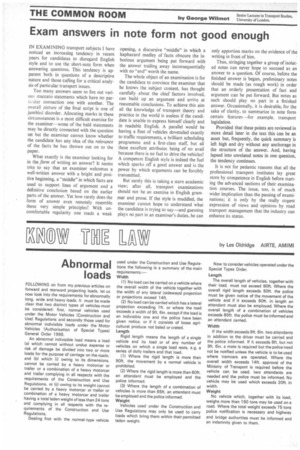Exam answers in note form not good enough
Page 64

If you've noticed an error in this article please click here to report it so we can fix it.
IN EXAMINING transport subjects I have noticed an increasing tendency in recent years for candidates to disregard English style and to use the short-note form when answering questions. This tendency is apparent both in questions of a descriptive nature and those calling for a critical analysis of particular transport issues.
Too many answers seem to fire out various staccato statements which have no particular connection one with another. The overall picture of the final script is one of jumbled disorder. Allocating marks in these circumstances is a most difficult exercise for the examiner—some of the bald statements may be directly connected with the question set but the examiner cannot know whether the candidate has any idea of the relevance of the facts he has thrown out on to the paper.
What exactly is the examiner looking for in the fonn of writing an answer? It seems trite to say that an examiner welcomes a well-written answer with a bright and positive beginning, a "middle" in which facts are used to support lines of argument and a definitive conclusion based on the earlier parts of the answer. Yet how rarely does the form of answer even remotely resemble these very simple principles! With uncomfortable regularity one reads a weak opening, a discursive "middle" in which a haphazard medley of facts obscure the laborious argument being put forward with the answer trailing away inconsequentially with no "end" worth the name.
The whole object of an examination is for the candidate to convince the examiner that he knows the subject content, has thought carefully about the chief factors involved, can build up an argument and arrive at reasonable conclusions. To achieve this aim all the knowledge of transport theory and practice in the world is useless if the candidate is unable to express himself clearly and in readable English. A parallel would be having a fleet of vehicles dovetailed exactly to traffic requirements, a brilliant scheduling programme and a first-class staff, but all these excellent attributes being of no avail because there is no fuel to drive the vehicles! A competent English style is indeed the fuel which sparks off a good answer and is the power by which arguments can be forcibly transmitted.
But surely this is taking a stern academic view; after all, transport examinations should not be an exercise in English grammar and prose. If the style is muddled, the examiner cannot hope to understand what the candidate is trying to say—and guessing plays no part in an examiner's duties, he can only apportion marks on the evidence of the writing in front of him.
Thus, stringing together a group of isolated notes can never hope to succeed as an answer to a question. Of course, before the finished answer is begun, preliminary notes should be made (as rough work) in order that an orderly presentation of fact and argument can be put forward. But notes as such should play no part in a finished answer. Occasionally, it is desirable, for the sake of clarity, to summarize in note form certain features—for example. transport legislation.
Provided that these points are reviewed in more detail later in the text this can be an asset but, frequently, the quick summary is left high and dry without any anchorage in the structure of the answer. And, having lapsed into unrelated notes in one question, the tendency continues.
It is not for pedantic reasons that all the professional transport institutes lay great store by competence in English before starting the advanced sections of their examination courses. The issue, too, is of much wider implication than the passing of examinations; it is only by the really cogent expression of views and opinions by road transport management that the industry can enhance its status.




















































































